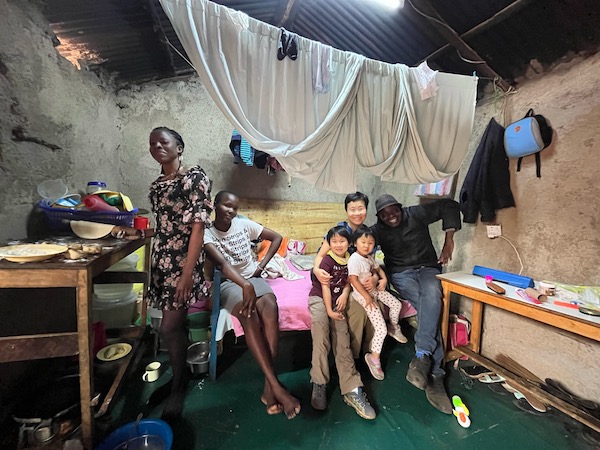I booked a tour of Kibera, known as the “largest slum in Africa”, through Airbnb Experiences. I had initial hesitations because firstly, I wasn’t sure if there would be any safety concerns in such an economically deprived area and secondly, we absolutely want to avoid any form of voyeuristic or exploitative tourism. My fears were abated after learning that the host, Erick, was a Kibera native and runs a social enterprise helping children from the area get an education. In his listing, he said that half of the proceeds of the tour income go to support his social enterprise mission. There were also many many positive reviews, citing Erick’s warm personality and passion for sharing and educating others about life in Kibera and that put me at ease.
Once we entered Kibera, it was obvious from the unpaved roads, the trash littering the streets and the poor construction of the single-story buildings, that we had arrived. When the Uber driver dropped us off at the corner of our meeting place, Makina Market, I felt uneasy. The residents looked at us with curiosity but not in any menacing kind of way.
Erick arrived wearing a black fedora that was frayed at the edges and he had a wide smile. He brought us into the Makina Market and we proceeded toward his office. Makina Market is a market that sells a wide array of goods. There are industrial goods like metal work, wholesale food products like oils and grains, a fruit and vegetable market, a clothing market, a cooked food market and even offices. It was Sunday so many of the stalls were closed as most Kenyans go to church on Sundays.
There were some stalls that were open and I took great interest in the second-hand clothing market where vendors buy used clothing imported from other countries in bales. They sort the clothing by type (men, women, children, babies) and display it to buyers. Most pieces of clothing cost 20-50 Kenyan Shillings (US$ 0.14 – 0.34). Almost all were in good to excellent condition. We stopped by a stall that exclusively sold sleep sacks for babies. I recognized some of the sleep sacks that my children used to wear.
The US, China and the UK are the three largest exporters of used clothing. After clothing is carelessly purchased and tossed out in wealthier countries, there is a whole other plane of existence for them in less wealthy countries, where they continue on their journey. In case you are curious where your donated and discarded clothing end up, the three largest importers of used clothing are Ghana, Pakistan and the Ukraine. Kenya is not too far behind and is ranked #5 in second-hand clothing importers. (United National Economic Council for Europe; Used Clothing; https://oec.world/en/profile/hs/used-clothing#:~:text=In%202021%2C%20the%20top%20exporters,%2C%20and%20Kenya%20(%24169M))
Erick took us on a walking tour of Kibera and to a crossroads of sorts along the railroad that bisects Kibera. It was essentially the main intersection in town where residents need to cross to get in and out of Kibera. Children also meet there to play soccer. It also happens to be a huge garbage pit where residents dump their trash. If not for the mild weather and overcast skies, the stench of the garbage would be overwhelming. There were people and children picking through the heaps of garbage for anything of value. There were goats walking through the mountains of garbage, looking for something edible, and occasionally tumbling into the pit. Nearby, there were groups of children playing soccer with homemade soccer balls. Many people were crossing through the area, on their way to church or to see friends, careful not to step into the muddy pits. In the middle of it all, there were also food vendors. We noticed one local stop to by a hard-boiled egg topped with tomatoes from a vendor selling this common snack from a plastic box. If you just ignored the trash and the goats, it was just a typical Sunday morning scene of people enjoying their weekend.
On the other side of the railroad track was where Erick lived. Here, narrow alleys, bifurcated by an open sewer, were lined with homes on either side. Clothes were drying on lines that zigzagged through the alleyways. Our youngest had to use the bathroom so we stopped at a public toilet. A friendly caretaker who was responsible for cleaning the bathroom collected 10 Kenyan Shillings (US$ 0.07) from us. Although the space was dark and cramped, it was clean. While others were asked to take their shoes off to step into the bathroom, the caretaker invited us to keep our shoes on. I felt guilty that we left footprints of red dust wherever we walked.
The entrance of Erick’s home was obstructed by a line of drying clothes. We had to push them aside to walk through the front door. It was a 3-meter by 3-meter wood structure with mud walls and a roof made of corrugated tin. It was sparsely furnished with a bed, a table, a few plastic chairs and a kitchen area. The room was divided in half by a curtain which Erick explained separated the bedroom area from the living area. He and his wife slept on the bed and his two children slept on mats on the floor. At the time, they had a house guest from Mombasa, his wife’s sister, who also slept on a mat. They use a shared public toilet a few minute’s walk away and each time, they must pay 10 Kenya shillings (about US$ 0.07). They prepare their meals on a narrow table by the door and underneath the table is an electric hot plate for cooking. While we were in their home, Erick’s sister-in-law was preparing chapati for lunch and shared some with us. Erick’s family has very few personal belongings.
I felt thankful that my family was allowed such an intimate glimpse into Erick’s life and home. We were welcomed by his wife and children and offered some simple food as guests in their home. Rich or poor, the dynamics of hospitality in one’s home are the same.
Erick described his life in Kibera. He faces many challenges in routine tasks related to day-to-day living, things we take for granted. Because there is no running water in Kibera, residents use 10 liter water tanks to transport water for daily use like drinking, cooking, washing dishes and clothes. Apart from furniture, the water tanks occupy the most room in Erick’s home. Whenever they need to use the bathroom or want to take a shower, they need to go to the public toilet and public shower, pay and wait their turn in line. A turn in the bathroom costs about US$ 0.07 and a shower costs about US$ 0.10. The price is the same for adults and children. I asked him what happens when you have an upset stomach or diarrhea. He said it can get expensive and because bathrooms close in the evening around 9 pm, if you have to go in the middle of the night, you need to come up with “creative solutions”. I can only image what that means.
I always have snacks and candies in my backpack in case my kids get hungry. This day, I had M&M’s and some other chocolate candies. I wasn’t sure if it was the right thing to do, but I offered it to Erick’s children. They seemed to really enjoy the candies.
I asked Erick what would be his greatest wish for his children. He said that it was for them to get an education so they can improve their “economic predicament”.
I asked Erick what he thought was the most important thing a person in Kibera could do to become successful. He said it was to “get organized”. He elaborated that in order to get to your job on time, you need to organize yourself and plan ahead. If you need to get to your job at 9 am, you need to get ready early so you have enough time to wait in line at the public bathroom. You need to arrive at the bus stop early enough to get a seat on the bus with ample time to make it to your place of work because buses do not run on a fixed schedule; they depart only when they are full. So in order to get to your job at 9 am, you may have to wake up at 6 am to cope with the uncertainty of how long you will need to wait – to use the bathroom and to catch the bus. This requires a great deal of organization, before you even arrive at work and start your day.
I have deep respect for Erick and his effort to create a better life for his family and his community. Being a tour guide in Kibera is his main source of income (He also sells hand-made Kenyan crafts on Etsy). From what I gather, demand can be unpredictable, but on the whole, can generate a fairly good income. He is outstanding at what he does as he is one of the top Experiences in Nairobi on Airbnb with an overall rating of 4.98/5 stars. He is doing well enough so that he has recruited two other people to help him when he has overlapping bookings.
Erick has no company, no business partners and no investors. He is a true entrepreneur, using his ingenuity, determination and resourcefulness to build a market by connecting with tourists like us. The product that he offers is his story and there are many like us who are willing to pay so that we can learn about Kibera and be a small part of Erick’s journey to create a better life.
Author
-

Song is the mother of four children. She and her family have stepped away from it all and in September 2023, began traveling the world while homeschooling. Song is an ABC (American born Chinese) and has an undergraduate degree from Cornell and an MBA from Harvard. She is an entrepreneur and an educator. Her hobbies include learning, traveling, reading, cooking and baking, and being with children.


Powerful experience for all. Especially important our kids to experience as they grow up in such privileged family.
Thank you Francie! Glad someone is reading our posts. 🙂